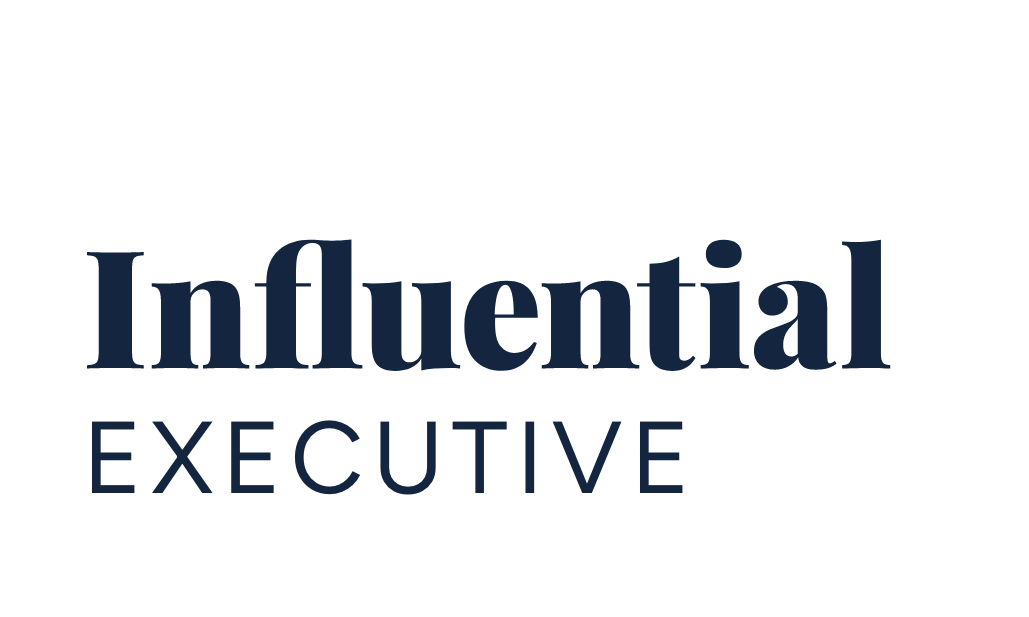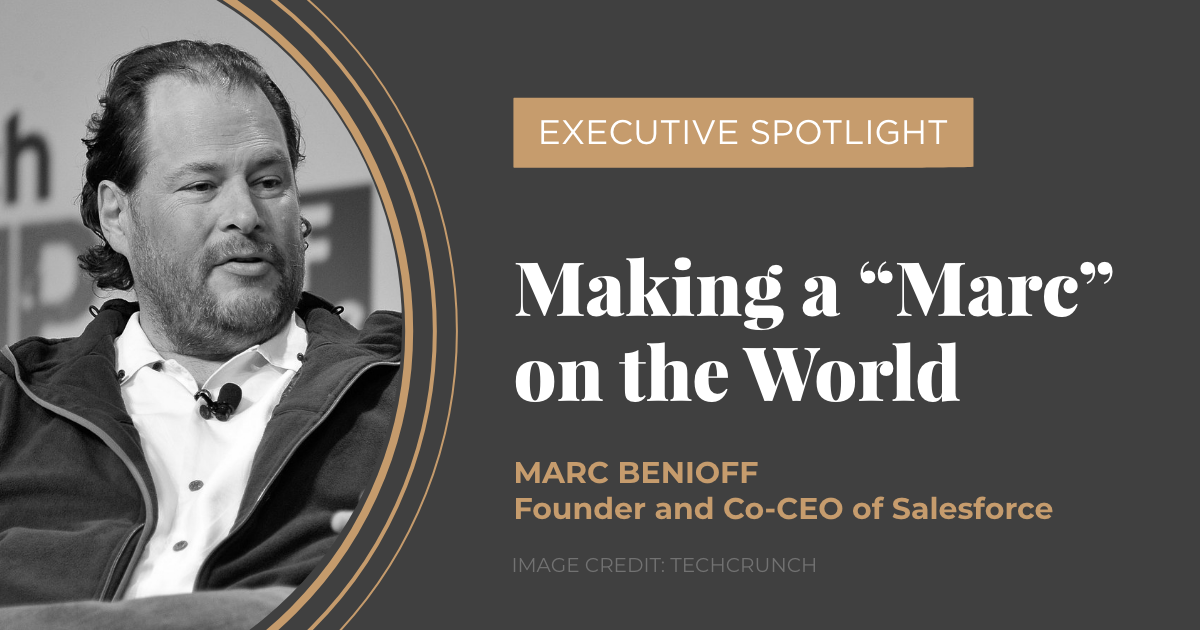In August 2018, Salesforce CEO Marc Benioff made the decision to promote the company’s COO Keith Block to be its new co-CEO. Salesforce’s long-time founder was prompted to partner up with Block after taking a two-week-long digital detox last July. After this brief hiatus, Benioff told CNBC that experiencing such tranquility without his electronics made him realize one thing: he was too busy. With Block now helping Benioff run the 20-year-old cloud-based software company, Benioff has been focusing his attentions on passion projects to use his position of power for social good. By focusing on this aspect of his leadership, Salesforce has also seen the added benefit of having a positive and public face for the brand.
From a quick glance at Benioff’s Twitter page, it is instantly clear what type of leader the Salesforce CEO and newly named owner of Time magazine strives to be. If the informal profile picture and user biography weren’t enough, Benioff’s constant posts concerning environmental protection, wage equality, and LGBTQ rights demonstrate the humanitarianism and authenticity he extends to his approach as a leader.
Salesforce stands today with the Israeli 🇮🇱 LGBTQ Community – Everyone should have an Equal Right to start and grow a Family – #EqualityForAll pic.twitter.com/q93Ce5Pci4
— Marc Benioff (@Benioff) July 22, 2018
Plastic has become the nuclear waste our generation. It’s not being recycled. Our oceans will have more plastic than fish by 2050 according to @WEF. We need new materials to replace what we have today. 9 rivers like this one represent 90% of the source. pic.twitter.com/cim7T3ZJDJ
— Marc Benioff (@Benioff) January 28, 2019
In this edition of Executive Spotlight by Influential Executive, we’ll explore how Benioff uses social media marketing as a means to project his philanthropic efforts and authentic thought leadership.
Keeping It Casual
When it comes to earning the respect of your employees, it comes highly recommended that a CEO be receptive and approachable. Despite his early and longstanding business success, Benioff’s Twitter profile portrays a modest, everyday entrepreneur. He is comfortable that his professional reputation will speak for itself and is consequently unafraid to be authentic for his followers. Alongside a very informal profile picture in which he is sporting sunglasses and a large grin, several of Benioff’s posts feature personal photos of the CEO himself, often throwing up peace signs. This laid-back presence humanizes the billionaire and draws in a younger audience that may otherwise feel unable to identify with him. However, Benioff adopts a careful balance of informal posts with friends and more serious tweets concerning social issues, which we will examine further below.
Great to meet @Benioff in Davos. @Salesforce is a good example of the kind of success @startupbahrain and @bahrainedb are trying to achieve with our entrepreneurs#WEF19 #Davos2019 #WEF #teambahrain #bahrain #startupbahrain pic.twitter.com/tNrHTmWepX
— areije alshakar (@areije) January 25, 2019
Community Engagement
More often than not, Twitter users will use the platform to share their own thoughts, feelings and opinions with the world. While Benioff does adhere to this practice, it is clear that he also values what his followers have to say. With every tweet and retweet, Benioff actively engages his audience by asking questions, taking polls and encouraging their input on his decisions. These invitational posts each result in hundreds of comments as followers respond to Benioff and become a part of the conversation he initiates. This collaborative approach shows that Benioff respects the opinions of his followers and is open to hearing their comments and criticisms. This not only benefits Benioff by providing him with valuable customer insight, but it also encourages members of the public to openly engage with the CEO, boosting his reach and engagement. Moreover, Benioff includes his email address in his public bio to make sure he is truly accessible to those who want to connect.
What should I ask the global leaders in @Davos that would get the world to stop whaling and killing dolphins for sport and become @FriendsofOcean?
— Marc Benioff (@Benioff) January 17, 2019
Constant Connection
On top of his content, Benioff’s successful online presence can partly be accredited to his posting frequency. It can be challenging for many executives to strike the perfect balance between posting enough to remain relevant, but not so many that it irritates their followers. According to a report by CEO.com, Benioff was named the most active CEO on Twitter among all Fortune 500 CEOs in 2016, sharing an average of 5.55 tweets per day. By doing this, he keeps his audience engaged and appropriately updated.
All-Around Activism
A simple search into Benioff’s history as a true-blue activist confirms the CEO’s dedication to social good. Not only does he frequently dip into his own pockets to aid various charities, he’s also taken matters into the hands of his company. In April 2015, Benioff made a point to review all Salesforce salaries to ensure men and women were being paid equally for comparable work. The following year, the CEO announced the company would cancel all employee programs and travel in the state of Indiana after the state passed the Religious Freedom Restoration Act–a bill that allowed companies and individuals to deny service to LGBTQ individuals based on religious beliefs. Additionally, Salesforce adamantly promotes Pledge 1%, an approach also known as the “1-1-1” model, in which companies contribute one percent of the product, one percent of equity and one percent of employee hours back to the communities they serve. Benioff’s activist efforts carry over to his online activity. He frequently tweets and retweets information concerning climate change, pollution, wage equality, homelessness and more with an aim to drive support and raise awareness. This constant activism on Salesforce’s CEO’s profile speaks in turn to Salesforce’s progressive politics on social issues as a company.
San Francisco is an inequality train wreck. Our homeless crisis must be our #1 priority. We can not continue to ignore the 7500 homeless individuals & 1200 homeless families & children on our streets. This is everyone’s responsibility. @SaraEisen @CNBC pic.twitter.com/2iB8SgV4Uj
— Marc Benioff (@Benioff) January 26, 2019
Room for Improvement
With this influential executive, there is little to criticize in terms of his social media marketing tactics. That being said, we have noticed that Benioff has a tendency to consecutively tweet and retweet the same information several times within a short duration. Although it may often be with the intention of getting a point across, this repetition runs a risk of leaving his audience feeling oversaturated with unchanging content. Benioff would benefit from being slightly more selective in his posts to prevent laborious scrolling for his followers.
All in all, Benioff’s Twitter is a direct representation of the leader himself: a truly authentic entrepreneur with a passion for inspiring social good.


